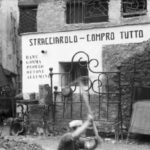Elsa Morante repeatedly stated that everything she had to say could be found in her books. She resisted both the temptation to participate in Italian political life and to take on the role of a public intellectual. Instead, she celebrated poetry as the highest means of political action and expression. Which is not at all to say that she was uninterested or disengaged in the sociopolitical struggles of her day. An anarchist at heart, she mistrusted political parties, ideologies, and all manichaean simplification.
While she debated passionately with her friends the issues of the day, she chose a very low public profile: no television appearances, very few interviews, and limited lectures. Yet on select issues that she perceived as urgent, she did not hesitate to speak up. During 1968, far right Catholic and neo-Fascist forces had brought criminal charges against the poet, theater director, and philosopher Aldo Braibanti, for plagio, that is, for psychologically enslaving two young men. This medieval sounding crime had been part of the fascist legal code but never enforced before. Yet, Braibanti — his accusers aiming at his political views, lifestyle, and anti-clericalism — was sentenced by the Corte di Assise in Rome to nine years of imprisonment. Before the final sentence, Elsa Morante wrote an open letter to Aldo Braibanti’s judges, (Lettera aperta ai giudici di Braibanti) published in the daily paper Paese Sera, on July 17, 1968.
Only in this case, she joined public statements by, among others, Umberto Eco, Ginevra Bompiani, Pier Paolo Pasolini, Cesare Musatti, Marco Pannella, and Mauro Misul.
Morante again resorted to an open letter to a newspaper in 1976, following the Franco regime’s ban on the publication of La Storia in Spain. This time she wrote to the daily papers Il Corriere Della Sera and L’Unità protesting the moral outrage of censorship. Again, two years later, when the Christian Democrat leader, Aldo Moro was kidnapped by the Red Brigades, Morante wrote a letter addressed to that terrorist organization, Letter to the Red Brigades, published in the journal Paragone, after Morante’s death.
Because of your young age, you have not experienced on your flesh the history of the this century. Perhaps you have not studied it enough and count on the ignorance and lack of experience of other youth to draw them to follow you. I want to believe that you do not realize of the corruption that you can exercise on the consciences, nor of the unthinkable consequences that could befall them. To those who by chance may have read my books, it is known how I regard organized society. But no matter how idle and corrupt one might consider some of the current societies, I wish I will not live to see a new totalitarianism. Letter to the Red Brigades, 1978
Her essay Pro or Against the Atom Bomb from 1964-1965 (delivered as a lecture and published in 1987 in a collection of essays with that same title) points to the strength of her convictions, and to her arguing style: uncompromising, drastic, and always substantial.
She addressed, in parallel, what it means to live under the menace of nuclear annihilation, and how poetry can be conceived as a political tool.
For her, as for Primo Levi, there cannot be credibly authentic esthetic/poetic concerns, devoid from an ethical stance. The writer must choose between an enterprise of life/poetry/community and one of death and planetary destruction.
In a time where public debate circled around political manifestos, Morante proposed a poetic manifesto in the form of The Song of the H.F. and of the U.M. in Three Parts.
Morante did not see herself as a “writer” or a “novelist,” but rather as a poet. Poetry, from ancient Greek ποιησις (poíesis), means the act of creation, an art form in which human language is used for its aesthetic qualities in addition to its notional and semantic content. For Morante, this was a place where one could express simultaneously joy and grief, ecstasy and despair. In 1945 she wrote:
It is the task of the poets to continually renew the world in the eyes of men that habit makes blind and distracted. To re-introduce them to the world with new images, this is the task given to the poets that Saturday in which He finished the creation and rested. “I created the world,” he said. “You have to make it young and new to mankind, forever. From here the immortal necessity of poetry, without poetry, man dies of starvation.



